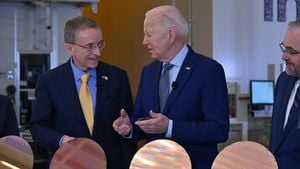Efforts to curb global plastic pollution have reached a fever pitch during the fifth round of the UN's Intergovernmental Negotiation Committee (INC-5) held recently in Busan, South Korea. Delegates from 175 nations have gathered with the goal of crafting a legally-binding treaty aimed at significantly reducing the plastic waste crisis, underscoring the gravity of the issue facing the planet.
At the start of the deliberations, UN Environment Program Executive Director, Andersen, referred to the moment as historic, saying it represented both "a moment of truth" for the environment and humanity, and calling for nations to commit to ending the plastic crisis.
The INC-5 is viewed as the culmination of years of discussions, taking off from resolutions passed during the UN Environment Assembly session back in March 2022. Still, by Thursday, frustrations were palpable among participants. None of the draft texts under consideration garnered unanimous support, and many fear minimal progress as the deadline looms closer.
With just two days remaining before the December 1st deadline, delegations have not yet produced any agreed-upon drafts, reflecting significant divides. This is particularly evident on contentious issues like caps on plastic production and bans on certain toxic chemicals linked to plastic items. Advocates from small island nations and developing countries—those hardest hit by the consequences of plastic pollution—have voiced their grievances, demanding stronger commitments from larger economies.
A delegate from Colombia articulated the collective frustration, noting, "All week has been exceedingly frustrating because, basically, the non-ambition countries took the upper hand in negotiations." The divide between those advocating for ambitious environmental policies against those resistant to change is stark and evident.
Reactions among environmental organizations have been mixed. Groups such as Greenpeace criticized the proposed 'non-paper' drafted by the INC chair, arguing it was merely an attempt to expedite the negotiations for the sake of reaching any agreement and failing to confront the underlying issues effectively. Graham Forbes, head of their delegation, emphasized, "Member states must reject tokenistic agreements. We cannot afford illusions when addressing the plastic pollution crisis."
Meanwhile, the South Korean government introduced its own compromise plan to encourage progress during the summit. The plan champions maintaining the treaty's legally binding nature but suggests allowing countries some leeway through voluntary measures. Despite this, activists are worried this might lead to inadequate solutions.
Critics warn against compromising efforts, arguing, "A weak treaty based on voluntary measures will break under the weight of the plastic crisis and lock us all in with this devastating issue." Twitter has seen numerous hashtags trending as public awareness surges around the stakes of these negotiations, emphasizing transparency and accountability.
The large presence of corporate lobbyists at INC-5, believed to outnumber EU delegates, also sparked concern. Reports indicate the petrochemical and fossil fuel industries had significant influence, with accusations asserting these entities prioritize profits over the health of local communities and ecosystems impacted by plastic pollution.
On the ground, the message from participants is clear: time for action is running out, and the stakes have never been higher. Global plastic production is on the rise, and forecasts suggest it could increase by 70% by 2040 if no concrete steps are taken. The last few days of negotiations are pivotal and represent potentially the last chance to enact transformative measures against plastic pollution.
Adding to the complexity are the voices of waste pickers, who play invaluable roles in managing plastic waste but are often overlooked by delegates at these summits. Billions rely on their collection and recycling efforts globally, yet they lack legal recognition. Speakers like Maria Soledad Mella Vidal from Chile and Johnson Doe from Ghana demand inclusion and respect, articulately making the case for their significant frontline contributions to managing plastic waste.
“If there’s any discussion… we should be involved,” said Johnson Doe, highlighting their work as integral to the fight against plastic pollution. Activists point out waste pickers are exposed to hazardous conditions and would benefit enormously from recognition and support within any finalized treaty.
The final days of INC-5 remain uncertain and fraught with challenges, but for many, the message is clear—timely, transformative action is not just necessary but achievable if all parties find the will to commit to meaningful agreements.



